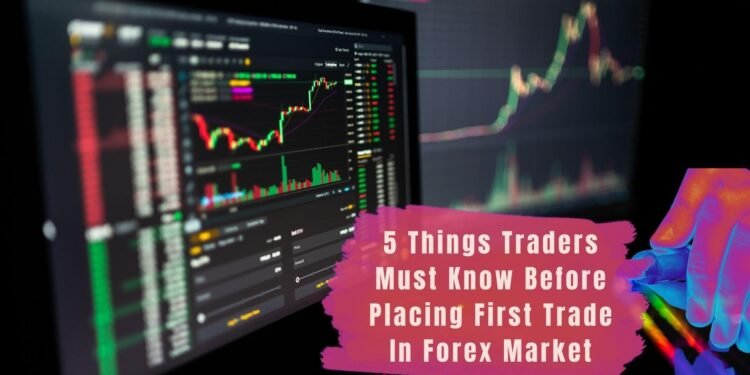Doing any task for the first time requires a lot of learning and preparation, which applies to forex trading, too. You will have a lot of expectations while stepping into the lucrative space as a new trader. Any beginner would want to give their best and mark a successful beginning to their trading journey, but it won’t be possible unless you gather enough knowledge and proceed with a solid action plan. You need to be careful while taking each and every step, as the smallest mistake can lead to huge losses in the volatile market. But this should not stop you from exploring the profitable opportunities as risk and rewards co-exist in the world of trading.
This article is a must-read for all beginners as you will get to know the 5 most important things that you must know before placing your first trade in the forex market.
Finding a Regulated Broker to trade with
One of the most crucial decisions that one has to make while entering the forex world is choosing a broker. You won’t be able to access the forex market without a forex broker, as they are the intermediaries bridging the gap between traders and the global currency market, which is connected on a virtual level. Unlike other financial markets, the forex market does not have a physical existence. Still, traders from all parts of the world can become a part of it by signing up with a forex broker and opening a trading account on an online forex trading platform like MT4 or MT5.
These platforms are meticulously designed to facilitate online trading, and MT4 was especially the first trading platform to make trading currencies easier. It was loaded with tools and features that complemented forex currency pairs as the primary asset class. Almost all forex brokers have integrated MT4 into their site as a trading platform, and it would be ideal to consider such brokers as a viable option. Besides the technical infrastructure, brokers also team up with liquidity providers to provide traders with the best prices or real-time quotes.
Your trading experience and results on their platform greatly depend on the trading conditions provided. Your profitability will be impacted by the trading cost charged in the form of spreads and commissions. The best thing you can do here is to find a regulated broker; that way, you can ensure the security of your funds or trading capital. Brokers who are registered with top-tier regulatory bodies like CySEC or FCA are constantly monitored and are obliged to follow the standards set for protecting the interests of traders. Hence, trading with a regulated broker is a safe choice.
Open a Demo Account First
While signing up with a broker, you will see 2 options. One is a live or real trading account, where you will be asked to deposit funds to start trading, and the 2nd one will be a demo account, where you get to trade with virtual funds or fake money. Demo accounts are more like replicas of real trading accounts with all the tools and features, and they will simulate a realistic trading experience by letting you become familiar with real-time market conditions. The primary benefit of demo trading is that it is completely risk-free, and anyone can try it out after submitting some basic personal information.
Demo accounts allow you to test the functionality of a broker’s trading platform and get a glimpse of the trading conditions offered. But the biggest advantage of demo trading is the fact that it is a safe place to practise and polish your trading skills. As a beginner, you don’t have enough knowledge and experience, which adds to the risk, but you can make up for this by spending enough time on a demo account. You can also try out different strategies, trading techniques and even analytical tools to find the best one for yourself.
On the other hand, if you jump right away into live trading without any prior experience, it will be a stressful experience as you are risking real funds. So, I suggest you use the demo account facility before placing your first trade on a live account.
Gain More Market Knowledge
I have to admit that new forex traders have the advantage of having access to a lot of information that was only known by insiders in earlier days. In the past, only experienced traders were fully aware of the market dynamics, and learning was harder in the absence of reliable sources. But 21st-century traders can simply make use of their smartphones and learn all the trading concepts through online websites. Hence, you must make use of the available resources to gain more market knowledge.
You will be trading with various international currency pairs that are constantly fluctuating, and tracking the potential price movements requires some market knowledge. You should be well-versed with the market trends and must be good at analysing the market scenario to find the ideal trade setups. Devising a profitable strategy also requires market knowledge, as your trading system must be good enough to withstand the test of time. We often hear that knowledge is power and market knowledge is the real power when it comes to forex trading.
When it comes to the forex market, having market knowledge is about understanding different currency pairs, being able to carry out technical analysis, being well-versed with the fundamentals and combining all these aspects while making trading decisions.
Understand the Risk and brace yourself
When you get into forex trading, you will be focused on the possible rewards, but you should never ignore the risk of potential losses. When we place a trade, we expect the market to move in our favour, and that is what we want to make profits. But what happens in the forex market is beyond our control, and sometimes our analysis, calculation and anticipations can go wrong. In that case, we will surely encounter a loss, but we need to prepare for the losses in advance and take steps to limit them.
Those who jump into live trading without thinking about the risk will surely get hit by unwanted losses, which is a terrible experience for a novice trader. Hence, you need to understand the risks of trading and brace yourself before placing your first trade. There are different types of risks that you have to deal with in the forex market. This includes market risk, counterparty risk, operational risk, interest rate risk, liquidity risk, volatility risk, leverage risk, psychological risk and more.
You can never fully avoid the risk, but a sound risk management plan will function as a safety net whenever things go wrong, and that is what professional trading is all about. Being risk-averse will limit your profit prospects in the forex world. Taking calculated risks with an optimal risk/reward ratio and limited leverage can save you from disasters even when the market is not moving in your favour.
Setting Stop Loss in every trade
This point is directly related to the previous point where we talked about understanding the risk and managing the same. Setting a stop loss is a key step in risk management as it protects your capital even when your trading decisions turn out to be wrong. Imagine you enter a trade and leave it to run on your own. When you return to your trading space, you realise that the market is moving in the opposite direction of your position, and your account is sinking with a huge unrealised loss.
This loss could have been avoided if you had placed a stop loss at the time of entering the trade. Stop loss orders are used for an automated exit in case of a loss, as the trade will be closed once the price reaches the specified levels. You can make use of trading calculators to calculate the optimal price values for placing accurate stop loss by entering different exit prices on a profit/loss calculator and considering potential losses.
After placing a stop loss, you can let your trade run freely and feel at ease, as you will be out of the trade once the price reaches the stop loss level. You might find traders who follow no-stop loss strategies, but that’s a bad idea unless you can keep your eyes glued to the screen all along.
Final words
Finally, one bonus tip about forex trading is that you can never expect to get it right in your first attempt. For beginners, it takes time to get good at trading and making mistakes is normal. The key to success is learning from your mistakes and correcting them.












